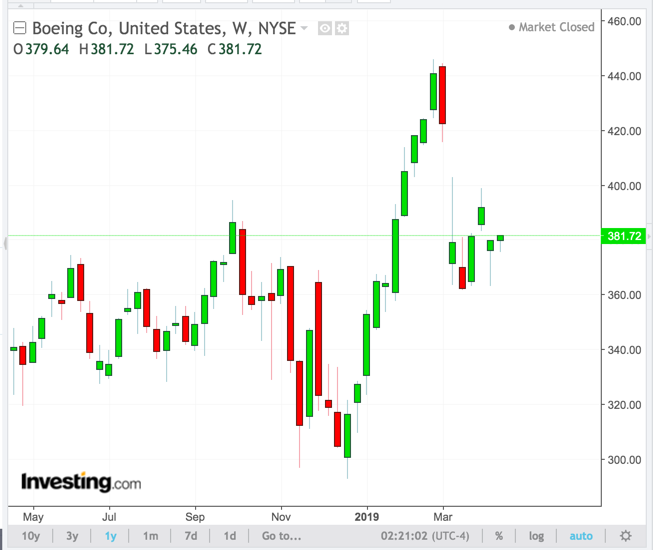* Reports Wednesday, April 24, before the open
* Revenue Expectation: $23.08B
* EPS: $3.25
Boeing Co. (NYSE:BA) is still reeling from one of the worst crises in its corporate history after two fatal crashes involving its best-selling plane. But the American aviation giant will get another chance next week to calm wary investors when it releases first-quarter earnings on Wednesday, April 24.
Shareholders will want to know what impact the world-wide grounding of its 737 MAX jetliner has had on the company's earnings momentum and long-term growth plans after the two deadly crashes within five months forced the company to cut its 737 production by 19% and form a committee to review the design and development of its aircraft.
The stakes are high for both Boeing and for the U.S. economy. The 737, which first entered service in the late 1960s, is the aviation industry’s best-selling model and Boeing’s top earner. The re-engineered MAX version was so successful it attracted over 5,000 orders worth more than $600 billion, including planes that have already been delivered, according to Bloomberg data.
Deposits from 737 MAX orders helped boost Boeing’s revenue above $100 billion for the first time last year. That drove the Chicago-based company’s market cap to over $250 billion before the Ethiopian Airlines crash last month, the second after October’s fatal incident that also involved the 737 MAX, operated by Indonesia’s Lion Air.
The 737 MAX is Boeing's largest contributor of product revenue and earnings before interest and taxes (EBIT), according to Goldman Sachs estimates, with the potential to make up 45% of Boeing’s EBIT over the next five years.
According to Credit Suisse, a combination of negative developments may hurt Boeing’s cash flows by $3.7 billion this year, or about a quarter of the cash flow forecast by the bank.
No Swift Return to Normality
One of the most important questions that Boeing executives will need to answer at the conference call is how long it will take for the company to return to its normal operating capacity. The answer, however, depends upon the conclusion of multiple inquiries in various jurisdictions, Boeing’s ability to quickly release the software fix, and the lifting of a global ban on 737 MAX.
In our view, a swift return to normal operations looks highly unlikely. Boeing engineers are still finishing work on a software update for a stall-prevention system linked to both the Lion Air and the Ethiopian Airlines disasters. However, one silver lining for Boeing stock and its investors is that the company has averted a worst-case scenario in which there were different causes for each of the two crashes, with the engineers still struggling to find the technical solution.
Still, we don’t see Boeing stock regaining its lost ground in 2019 as disruptions to its 737 MAX deliveries are ongoing and investors won’t get much clarity even in the upcoming earnings call. Boeing shares have fallen almost 10% since the Ethiopian Airlines crash on March 10, closing yesterday's session at $381.72.

With the build-up in inventories and production cuts, Boeing will this year also have to deal with the complexities of penalties owed to customers, negotiations with regulators and airlines and managing its cash flows. All of this means lower margins and lost opportunities in the short-run.
Bottom Line
Despite this dismal outlook and the headline risk in the short-run, we strongly believe that Boeing stock will recover from this crisis. Airlines have no alternative but to pick one from the Boeing-Airbus (PA:AIR) plane-maker duopoly. This bearish spell also offers an opportunity for long-term investors to take advantage of Boeing's share weakness and consider adding this excellent dividend stock, which currently yields 2.19%, to their portfolios.
